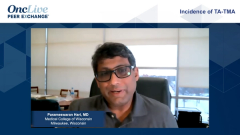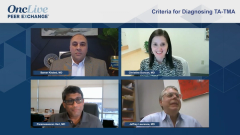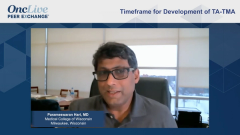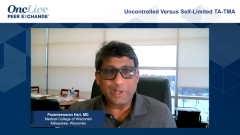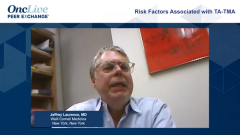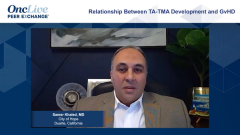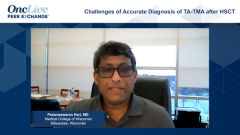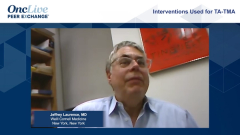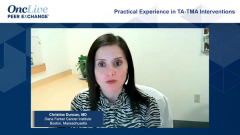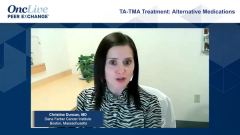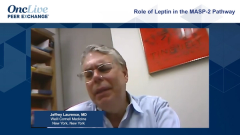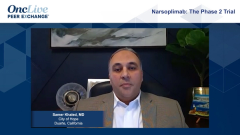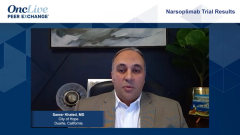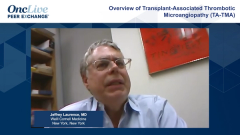
TA-TMA Treatment: Alternative Medications
The panel reviews therapeutic options for managing transplant-associated thrombotic microangiopathy and the challenges associated with currently existing agents.
Episodes in this series

Samer Khaled, MD: That’s a good segue to talk about eculizumab. There are evolving data about the use of eculizumab in clinical trial by [Sonata] Jodele, [MD, of the Cincinnati Children’s Hospital Medical Center in Ohio] and others. It’s probably more used in pediatric population than in the adult population....
Christine Duncan, MD: We use it quite frequently. If [a patient has received a diagnosis] of TA-TMA [transplant-associated thrombotic microangiopathy] and has any degree of significance or injury to them, there’s always a conversation....That is how it is at our center, every center is a little bit different. We’re quite fortunate where I work in that if we want to use eculizumab we’ve all done our training and we can get the drug pretty quickly.
....[Jodele’s trial data] showed significant differences in outcomes; when you use eculizumab, that clinical trial was important and moved us forward to comfortably using it....
The challenge is that [individuals] sometimes put such faith in it that they get really confused; why is this patient still sick when your CH50 [Complement Total Blood Test] is down? What do we do now and how do you treat that? There’s a lot of faith in a drug that has shown good outcomes, but it’s not perfect.
The other issue is there’s really no consensus on how long to treat it, when to go up on your dose, when to space your dose? For our patients, it is a real challenge. We’re very lucky if we get to that spot where someone’s symptoms are completely resolved and they have no renal markers, no hematologic markers; they can stop the drug or we can space the drug. When do you stop? Does someone have to have complete resolution of their symptoms or findings, or do they have to have partial? Do you space? What happens?
Then the other tricky thing is that if you do have a patient who is a survivor of TA-TMA and...they’re leaving the hospital, it’s a whole lot easier to get the drug in the hospital than it is outpatient in the clinics. Now you’re dealing with a whole other set of challenges, trying to get your authorizations for the drug.
We’re lucky to live in an era where we have therapies that exist and promising therapies that are emerging, but we still have a lot to learn....We do use a lot of eculizumab but we have a lot of unanswered questions about it, as well.
Samer Khaled, MD: When talking about the dosing of the medication, what dose do you usually start with? Is it the (inaudible) or the 80 (inaudible) as the dose?
Christine Duncan, MD: That is generally where we will go. We’ll usually start at multiple times per week and then space it over time, spacing it down to weekly, then every other week. Starting is, I think, really the problem. What do you do once you start it? For us, it’s always a real question.
Samer Khaled, MD: Certainly there are other kind of experimental or trials of other medications, other than the eculizumab. I would like to invite Dr Hari to comment more about different other things that can be used in that setting.
Parameswaran Hari, MD: I think about the things that we have right now in kind of 3 or 4 different categories. The changeover of immune suppression, switching of agents, is 1 thing. Eculizumab is probably the most expensive option, but again, in the absence of a biomarker [such as] we have in subspecialized centers, in real life it’s difficult to monitor and give eculizumab dose base because of the cost and the institutional restrictions in many cases.
Then there is Rituxan [rituximab]. I have had patients in retrospect who had actually factor H antibodies that have benefited from Rituxan; that’s something that we had figured out after the Rituxan worked. Rituxan with steroids is something that we did quite a bit of before we got eculizumab; I suspect there is a small subgroup of patients who might respond to Rituxan and a steroid combination. Perhaps Dr Laurence can talk about that. Then [there is] plasma exchange; I’m not a believer in that. If it’s a true TA-TMA, I don’t think it does anything to the patient.
Then we have the approved drug defibrotide. In Europe there are decades of use and experience with defibrotide....It’s an anti-inflammatory agent, it can be thought of as an endothelial stabilizing agent; there is definitely a subgroup of people who do respond to it. Perhaps not as promising as a dedicated mannose-binding lectin pathway inhibitor, perhaps, but I think just from that 1 hit of the endothelium it might be able to be helped by this agent. Again, that is something that we don’t use too much of, unless we have some evidence of liver damage, because of the payment issues, at least in this country.
Jeffrey Laurence, MD: We always look for anticomplement factor H antibodies in our patients. In the tens of hundreds of allo [allogeneic stem cell] transplants that we did that had persistent TMAs, that had no complement mutations, none of them had evidence of anti–factor H mutations. Therefore, we treated none of them with Rituxan.
That is not true in the pediatric setting, at least in Jodele’s series. She found a fair incidence in 1 of her studies, and it was a lower incidence in another study of antibodies against common factor H. Someone could argue that just the treatment with Rituxan of those individuals might be sufficient. Again, in what I have seen in literature and in my own personal experience, in the adult population it has not been a factor.
Transcript edited for clarity.


